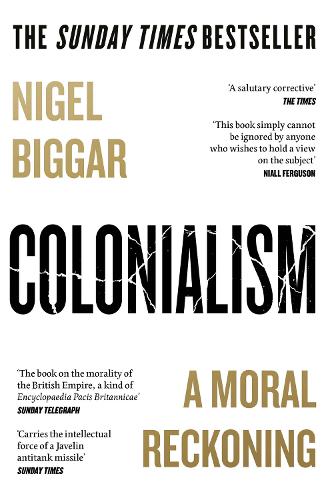
Colonialism: A Moral Reckoning
(Paperback)
Available Formats
Hardback
Published: 5th July 2023
Paperback
Published: 7th February 2023
Paperback
Published: 25th July 2024
Publishing Details
Colonialism: A Moral Reckoning
By (Author) Nigel Biggar
HarperCollins Publishers
William Collins
25th July 2024
14th March 2024
United Kingdom
Classifications
General
Non Fiction
European history
Political ideologies and movements
Social and ethical issues
Military history
Warfare and defence
325.341
Physical Properties
Paperback
480
Width 129mm, Height 198mm, Spine 38mm
400g
Description
The Sunday Times Bestseller
A new assessment of the Wests colonial record
In the wake of the dissolution of the Soviet empire in 1989, many believed that we had arrived at the End of History that the global dominance of liberal democracy had been secured forever.
Now however, with Russia rattling its sabre on the borders of Europe and China rising to challenge the post-1945 world order, the liberal West faces major threats.
These threats are not only external. Especially in the Anglosphere, the decolonisation movement corrodes the Wests self-confidence by retelling the history of European and American colonial dominance as a litany of racism, exploitation, and massively murderous violence.
Nigel Biggar tests this indictment, addressing the crucial questions in eight chapters: Was the British Empire driven primarily by greed and the lust to dominate Should we speak of colonialism and slavery in the same breath, as if they were identical Was the Empire essentially racist How far was it based on the theft of land Did it involve genocide Was it driven fundamentally by the motive of economic exploitation Was undemocratic colonial government necessarily illegitimate and, Was the Empire essentially violent, and its violence pervasively racist and terroristic
Biggar makes clear that, like any other long-standing state, the British Empire involved elements of injustice, sometimes appalling. On occasions it was culpably incompetent and presided over moments of dreadful tragedy.
Nevertheless, from the early 1800s the Empire was committed to abolishing the slave trade in the name of a Christian conviction of the basic equality of all human beings. It ended endemic inter-tribal warfare, opened local economies to the opportunities of global trade, moderated the impact of inescapable modernisation, established the rule of law and liberal institutions such as a free press, and spent itself in defeating the murderously racist Nazi and Japanese empires in the Second World War.
As encyclopaedic in historical breadth as itis penetrating in analytical depth, Colonialism offers a moral inquest into the colonial past, forensically contesting damaging falsehoods and thereby helping to rejuvenate faith in the Wests future.
Reviews
A fascinating read, informative, surprising and written with panache and clarity The Times, Andrew Billen
A thoughtful, compelling text Daily Telegraph, five-star review
A salutary corrective The Times, Book of the Week
Carries the intellectual force of a Javeline antitank missile. Colonialism is no apologia for empire but calls for balanceBiggar acknowledges wickedness in our nation but his version of history calls us to accept the messiness and moral compromises inherent in liberalism Sunday Times
Nigel Biggar has written the book on the morality of the British Empire, a kind of Encyclopaedia Pacis Britannicae. a thoughtful, compelling text Sunday Telegraph
An important, timely and brave bookthe first serious counter blast against the hysterical and ahistorical orthodoxy that has placed such a stranglehold on our public discourse on the British Empire, and as such will prove to be an indispensable handbook in the battles to come. It is also exceedingly well written and compellingly argued The Critic
An important book, as well as a courageous one Literary Review
Patiently argued and carefully balanced yet passionately committed to the production of a narrative which replaces denunciation and with evidences and understanding Quillette
Biggar fearlessly goes where few other scholars now venture to tread: to defend the British empire against its increasingly vitriolic detractors Those who wish to accuse the Victorians of genocide who seek gulags in Kenya or Holocausts in the Raj will probably not risk being triggered by reading this book. But they really should Biggars book simply cannot be ignored by anyone who wishes to hold a view on the subject
Niall Ferguson, Milbank Family Senior Fellow, Hoover Institution, Stanford University, and author of Empire: How Britain Made the Modern World
Author Bio
Nigel Biggar is Regius Professor of Moral and Pastoral Theology, and Director of the McDonald Centre for Theology, Ethics, and Public Life, University of Oxford.
